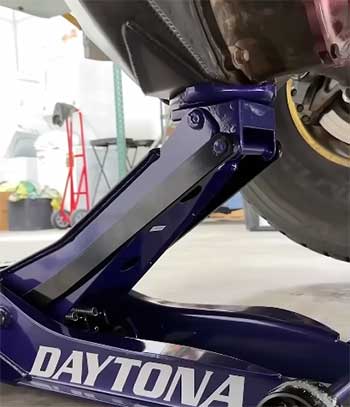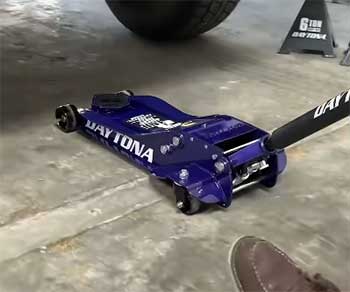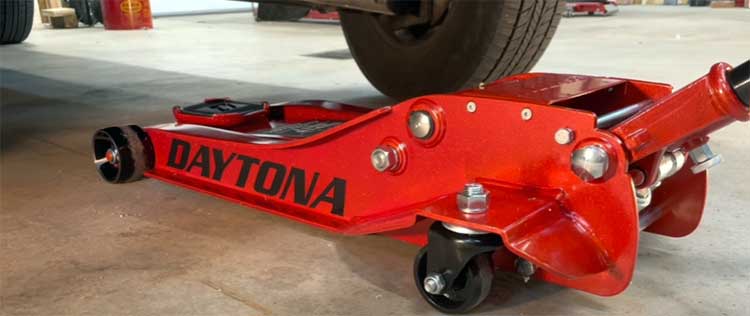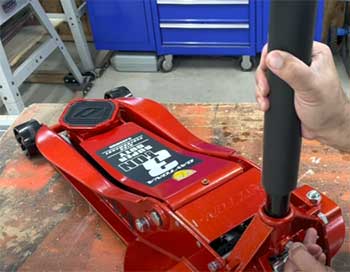I’m not one to throw around recommendations lightly, but if you’re in the market for a floor jack that’s tough, reliable, and won’t break the bank, the Daytona floor jack is the one to beat.
Whether you’re a weekend warrior tinkering with your ride or a seasoned mechanic, this jack delivers the kind of performance that makes lifting your car feel like a breeze. I’ve put it through its paces, and I’m excited to share why it’s become my go-to tool.
Trust me, you’ll want this in your garage.
My Experience With The Daytona Floor Jack

Let me set the scene: it’s a crisp Saturday morning, and I’m in my garage, ready to tackle an oil change on my trusty SUV.
My old floor jack, a clunky hand-me-down, was starting to creak and wobble like it was auditioning for a horror movie.
I knew it was time for an upgrade, so I picked up the Daytona 3 Ton Low-Profile Super Duty Floor Jack from Harbor Freight.
The bright yellow paint job caught my eye, but it was the promise of Rapid Pump technology and a 3-year warranty that sealed the deal.
Right out of the box, this thing felt like it meant business.
At just over 100 pounds, it’s no featherweight, but the sturdy steel construction gave me confidence it could handle my 5,000-pound SUV without flinching.
I slid it under the front jack point, and with just three or four pumps, the vehicle was up in the air, smooth as butter. The dual-piston system isn’t just a fancy buzzword—it really does cut down on the effort needed to lift heavy loads.
I was grinning ear to ear, not because I love oil changes, but because this jack made the process so effortless.
I’ve used it for everything from tire rotations to brake jobs, and it’s been a game-changer. The low-profile design slips under my lowered sedan with ease, and the 23-inch maximum lift height is plenty for most tasks.
One time, I had to jack up my buddy’s lifted pickup, and the Daytona didn’t even break a sweat. The universal joint release makes lowering the vehicle a controlled, gentle process—no heart-stopping drops here.
After a year of regular use, it’s still as solid as the day I bought it, and I’m not gentle with my tools. This jack has earned its spot in my garage, and I’m betting it’ll win you over too.
Pros of The Daytona Floor Jack
- Heavy-Duty Build That Lasts

The Daytona floor jack is built like a tank.
Its all-steel construction feels like it could survive a zombie apocalypse.
I’ve dropped it, rolled it over gravel, and used it in the grime of my garage, and the powder-coated finish still looks sharp.
This isn’t some flimsy tool that’ll buckle under pressure—it’s designed to handle up to 3 tons (6,000 pounds) with ease, making it perfect for everything from compact cars to beefy SUVs.
- Rapid Pump Technology Saves Time
Pumping a jack can feel like a workout, but Daytona’s Rapid Pump system is a lifesaver. With just a few strokes, I can get my car off the ground, which means less time huffing and puffing and more time getting the job done.
The dual-piston setup is the secret sauce here, delivering smooth, efficient lifts even under heavy loads. It’s like having a personal assistant who does all the heavy lifting for you.
- Low-Profile Design for Versatility
If you’ve ever tried to slide a jack under a low-riding car, you know the struggle. The Daytona’s 3-3/4-inch minimum height is a godsend for sports cars or lowered vehicles.
I’ve used it on my friend’s modified Civic, and it fit like a glove where other jacks would’ve been stuck. Yet, it still reaches up to 23-1/8 inches, so it’s versatile enough for taller vehicles too. It’s like the Swiss Army knife of floor jacks.
- Precise Control with Universal Joint Release
Lowering a vehicle can be nerve-wracking with some jacks, but the Daytona’s universal joint release makes it a breeze. A slow twist of the handle, and the car comes down gently, no matter where the handle is positioned.
I’ve never felt like I was gambling with my safety, and that peace of mind is worth its weight in gold.
- Three-Year Warranty for Confidence
Most jacks come with a measly 90-day warranty, but Daytona backs this one with a 3-year guarantee. That’s a bold statement about its durability. I haven’t needed to use the warranty yet, but knowing it’s there gives me extra confidence.
It’s like buying a tool with a built-in insurance policy.
Cons of The Daytona Floor Jack

- Weight Can Be a Hassle
Let’s not sugarcoat it—this jack is heavy. Clocking in at around 104 pounds, it’s not something you’ll casually toss in your trunk for a track day. I’ve got a bad back, and lugging it around the garage can be a chore.
The wheels help, but if you’re working on uneven surfaces like gravel, you’ll feel the weight. It’s a trade-off for the sturdy build, but it’s something to consider if portability is a priority.
- Saddle Pad Could Be Better
The rubber saddle pad is a nice touch for protecting your car’s undercarriage, but it sits a bit low in the saddle, meaning the steel edges can sometimes make contact first. I’ve had to be extra careful to avoid scratches on my vehicle’s frame.
Some users online have mentioned the pad wearing out quickly, so I keep an eye on mine and have a spare ready just in case.
- Pricey Compared to Budget Options
At around $200, the Daytona isn’t the cheapest jack on the block. You can grab a Pittsburgh or other budget brand for $30-$50 less. For occasional use, the price might sting, especially if you’re not sold on the extra features like Rapid Pump or the longer warranty.
But for me, the performance justifies the cost, especially compared to pricier brands like Snap-On.
Maintenance Tips For Your Daytona Floor Jack
- Check and Top Up Hydraulic Fluid

The heart of any hydraulic jack is its fluid, and the Daytona is no exception.
Every few months, I check the fluid level by removing the filler plug (usually near the hydraulic cylinder).
If it’s low, I top it up with high-quality hydraulic jack oil—don’t use motor oil, as it can mess up the seals.
Low fluid can make the jack sluggish or jerky, so keeping it topped up ensures smooth operation.
I learned this the hard way when my old jack started acting up, and I’m not making that mistake again.
- Bleed the System Regularly
Air bubbles in the hydraulic system can make your jack feel like it’s got the hiccups. To bleed it, I open the release valve, pump the handle a few times with the jack fully lowered, and then close the valve.
This pushes out any trapped air. I do this every six months or if the jack starts feeling spongy. It takes less than five minutes and keeps the Rapid Pump system working like a dream.
- Grease the Moving Parts
The Daytona has grease zerks on the main pivot points, which is a nice touch for maintenance. I use a grease gun with lithium-based grease to lubricate these spots every year or after heavy use. It keeps the wheels and lifting arm moving smoothly and prevents wear.
Don’t skip this step—neglecting it can lead to stiff operation or premature wear, and nobody wants a creaky jack.
- Inspect Welds and Bolts
Before every use, I give the jack a quick once-over. Check the welds for cracks and make sure all bolts are tight. I’ve never had an issue with the Daytona, but I’ve seen cheaper jacks fail because of loose hardware.
A quick inspection takes 30 seconds and could save you from a dangerous situation. Trust me, you don’t want to be under a car when a jack decides to give up.
- Store It Properly
When I’m not using the jack, I store it in a dry corner of my garage with the handle upright and the arm fully lowered. This prevents strain on the hydraulic system and keeps dust and grime out of the moving parts.
If you live in a humid area, consider a cover to protect the powder coat from rust. A little care goes a long way in keeping this jack in top shape.
Comparison of Daytona Floor Jack With Other Brands
- Snap-On: Premium Price, Similar Performance
Snap-On’s FJ300 floor jack is often compared to the Daytona, and for good reason—they’re nearly identical in design. Both are made in China, share similar specs (3-ton capacity, 23-inch max lift), and even look like twins, minus the color.
Snap-On sued Harbor Freight years ago, claiming the Daytona was a copycat, but the lawsuit fizzled out, suggesting they’re from the same factory. The big difference? Snap-On’s jack costs around $1,000, while the Daytona is a fraction of that.
I’ve used a Snap-On jack at a friend’s shop, and while it’s smooth and well-built, I couldn’t justify the price. The Daytona gives you 90% of the performance for a third of the cost, making it the smarter buy for most.
- Pittsburgh: Budget-Friendly but Basic
Harbor Freight’s Pittsburgh line is the Daytona’s budget-friendly cousin. I’ve owned a Pittsburgh 3-ton low-profile jack, and it’s solid for occasional use, but it lacks the polish of the Daytona.
The Pittsburgh is lighter (around 80 pounds) and cheaper (often under $150), but it doesn’t have the Rapid Pump system, and the warranty is only 90 days. The build quality feels a step below—mine started leaking after a few years of heavy use.
If you’re on a tight budget and don’t need the extra features, the Pittsburgh gets the job done, but the Daytona’s durability and ease of use make it worth the extra bucks.
- Torin Big Red: Reliable but Less Refined
Torin’s Big Red 4-ton floor jack is a popular choice for DIYers, and I’ve seen it in action at a local tire shop. It’s got a higher lifting capacity than the Daytona, which is great for heavier vehicles, but it’s bulkier and not as low-profile (minimum height around 4 inches).
The build is solid, but the pump feels less responsive, requiring more strokes to reach full height. Priced around $150-$200, it’s competitive, but the Daytona’s Rapid Pump and smoother release valve give it an edge for ease of use.
If you need extra capacity, Torin’s a good pick, but for most cars, the Daytona is more practical.
- Arcan: Lightweight but Pricey
Arcan’s 3.5-ton XL35R aluminum and steel jack is a favorite among pros for its lighter weight (around 60 pounds) and low-profile design. I borrowed one for a weekend project, and it’s a dream to move around, especially compared to the Daytona’s heft.
However, it’s pricier (often $250-$300), and the lifting arm felt less stable under heavy loads. The warranty is shorter too, typically one year.
If you prioritize portability and don’t mind the cost, Arcan’s a strong contender, but the Daytona’s durability and longer warranty make it a better all-around choice for home garages.
- Blackhawk: Heavy-Duty but Bulky
Blackhawk’s B6350 3.5-ton jack is built for serious lifting, with a higher lift height (22 inches) and a long handle for extra leverage. I used one at a shop, and it’s a beast for trucks and SUVs, but it’s not low-profile (5.5-inch minimum height), so it’s useless for low-clearance cars.
It’s also heavier than the Daytona and costs around $200-$250. The build quality is top-notch, but the extra weight and bulk make it less practical for home use. The Daytona strikes a better balance for versatility and ease.
Why the Daytona Stands Out?
What makes the Daytona floor jack special isn’t just its specs—it’s the whole package. The Rapid Pump system saves you time and sweat, the low-profile design fits under almost anything, and the 3-year warranty gives you peace of mind.
Compared to pricier brands like Snap-On, you’re getting near-identical performance without the eye-watering price tag. Budget options like Pittsburgh or Torin are fine for light use, but they don’t match the Daytona’s durability or finesse.
I’ve dropped this jack, used it in the rain, and pushed it to its limits, and it’s never let me down. It’s not perfect—the weight and saddle pad could be improved—but it’s as close as you’ll get to a pro-grade jack without spending a fortune.
Safety First: Using the Daytona Right
Before I get under any car, I make sure it’s on a flat, level surface with the parking brake on and wheel chocks in place. The Daytona’s job is to lift, not hold, so I always slide jack stands under the vehicle once it’s up.
I give the car a gentle push to test stability before crawling underneath—better safe than sorry. The Daytona’s wide base and sturdy build make it feel rock-solid, but I never trust any jack alone. Follow the owner’s manual for jack points, and you’ll be golden.
Frequently Asked Questions (FAQ)
Daytona floor jacks are manufactured in China, like many tools in the automotive industry. Despite the origin, they undergo strict quality control and meet ASME standards, which is why they’re trusted by mechanics and DIYers alike. The 3-year warranty on models like the Super Duty also speaks to their reliability.
It depends on your needs, but I’d put Daytona at the top for its balance of performance, durability, and value. Snap-On offers premium quality but at a steep price, while Pittsburgh and Torin are great for budget-conscious buyers. For versatility and long-term use, the Daytona’s features like Rapid Pump and a solid warranty make it hard to beat.
NASCAR teams often use high-end jacks from brands like Snap-On or custom-built models for speed and reliability under tight pit stop conditions. While there’s no definitive evidence that Daytona jacks are used in NASCAR, their similarity to Snap-On’s FJ300 suggests they could hold up in high-pressure environments, especially given their shared manufacturing roots.
Yes, Daytona floor jacks are made in China. This is common for many tool brands, including some Snap-On models. What sets Daytona apart is its rigorous testing and quality assurance, ensuring you get a reliable tool despite the overseas production.
Wrapping It Up: Get The Daytona Floor Jack
If you’re serious about working on your car, the Daytona floor jack is a must-have. It’s tough, efficient, and backed by a warranty that shows Harbor Freight believes in its quality. From its Rapid Pump system to its low-profile design, it’s built to make your life easier.
I’ve used it for countless jobs, and it’s never let me down. Don’t settle for a wobbly, cheap jack—invest in the Daytona and lift with confidence.


Thanks for the thorough Daytona review, Glenn. I just moments ago left a Harbor Freight store where I was faced with a choice between either Daytona or Pittsburgh. I asked my brother (certified mechanic of 30+ years) which was better of the two brands. He said he’d never come across either. I gave him a pass on that because 100% of his work has been in a city garage wrenching on the city bus fleet. Almost everybody in that shop buys tools from the Snap-On trucks making their rounds.
One quick query of “the internets” and your review turned up. Great timing considering you wrote it just a month ago. I’m sold on Daytona now. We’ve got two SUVs in the household now (one mid-sized, one full-sized), so the standard hydraulic jack I’d been using for our sedans just won’t cut it anymore. I went to take a wheel off my wife’s SUV yesterday to plug a leak in the tire and at full jack extensions couldn’t even clear enough height to spin the tire – much less remove it.
Thanks for the write-up. I’ll be going back to pick up a Daytona!